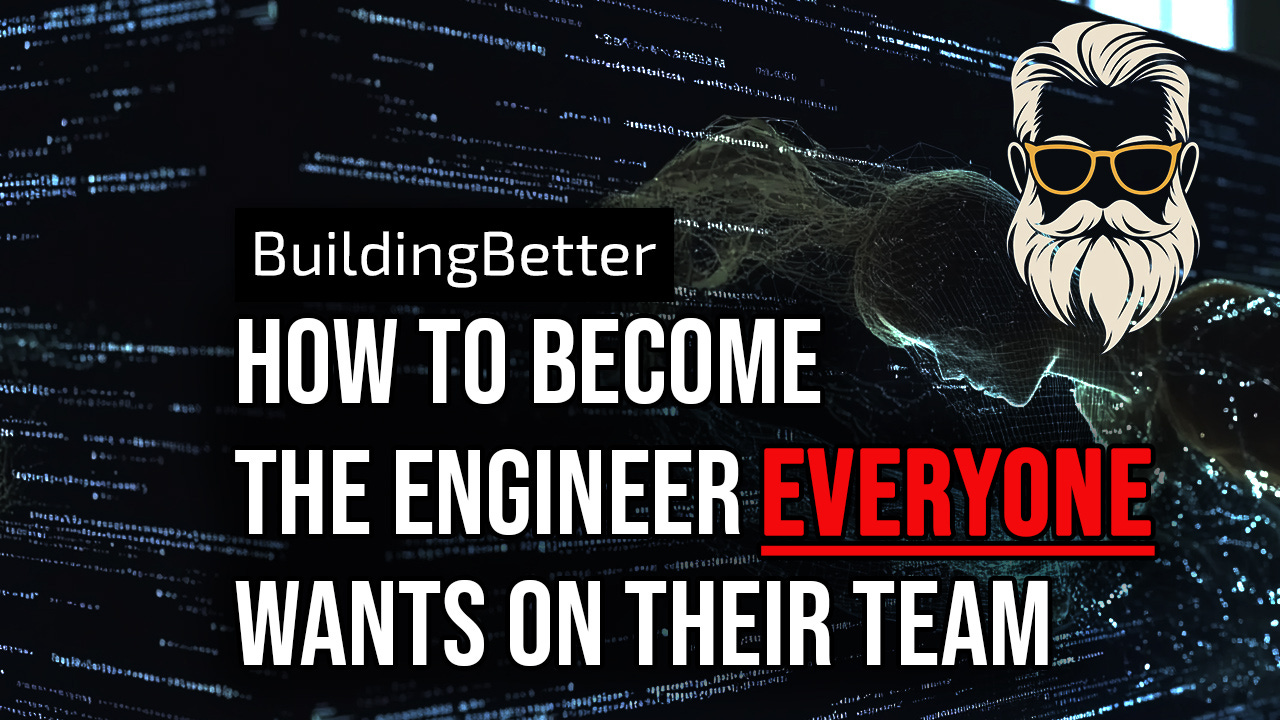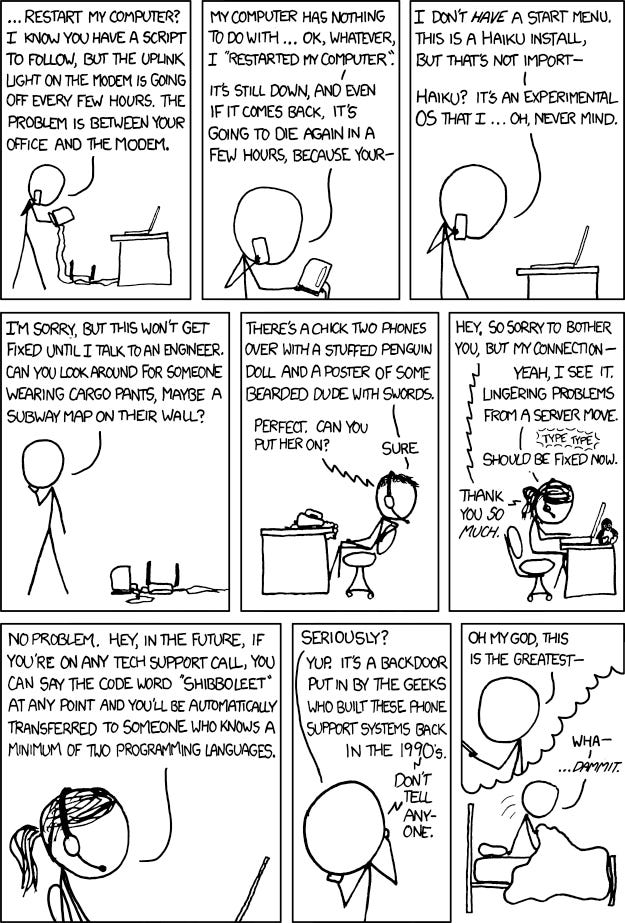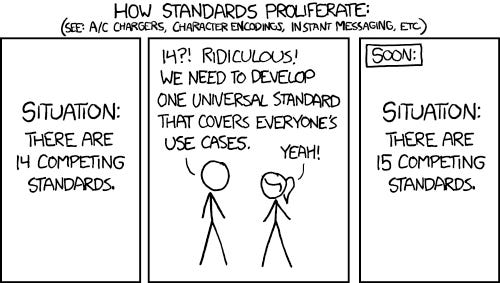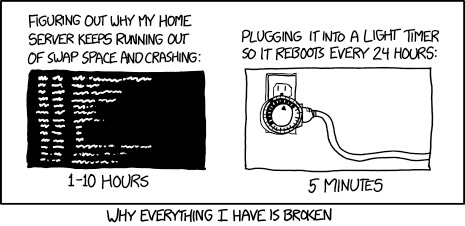How to Become the Engineer Everyone Wants on Their Team
It’s tempting to think that being a great software engineer is all about writing clean code. While clean code matters, it’s only the starting point.
Great engineers stand out not just for their technical skills, but for how they contribute to their team, company, and projects. Over years of mentoring and developing my own career, these are the key traits that I’ve found elevate engineers from good to indispensable.
Write Clear Documentation
Your code might be fire, but without good documentation, it’s just a black box to everyone else. Think of documentation as a map, it’s there to guide others (and your future self) through the logic and purpose of your work.
Using existing paradigms for your projects can help make this map easier to read and thus follow, for example following SOLID.
The best documentation isn’t verbose - it’s concise and clear. It explains what the code does, why it does it, and how someone else can use or modify it. And here’s the secret: your audience isn’t just other senior engineers. It’s everyone—junior developers, QA testers, product managers, and even the next hire who has to onboard with your system.
If your documentation saves one person an hour of debugging or helps the next person pick up where you left off, it’s worth every second you spent writing it.
Bridge the Gap Between Tech and Business
As engineers, we often focus on solving technical challenges, but the people who pay our wages care about one thing: outcomes. Business stakeholders don’t care how clever your code is; they care about how it solves their problems, and what the cost of that solution is, both in the short and long term.
Being able to explain your work in terms that non-technical people understand is invaluable. For example, instead of saying, “I optimized our API response time by 40ms,” you might say, “This change means customers can complete their orders faster, which reduces drop-offs and increases sales.”
Learn to reframe your technical wins in terms of business value. This skill alone can make you a standout in meetings and put you on the radar of leadership.
Stay Calm Under Pressure
Every engineer will face it: the dreaded late-night production issue, the show stopping bug, the "everything's broken" moment. How you handle these situations defines your value to the team.
The best engineers aren’t the ones who know everything off the top of their head; they’re the ones who stay calm, troubleshoot methodically, and keep the team moving forward. When you can debug under pressure without losing your head, you not only solve problems faster—you inspire confidence.
Remember, no system is perfect, and every team will have moments of crisis. Being the calm, collected person in the room makes you a rock in the storm.
Know When to Say No
Engineers are natural problem solvers (mostly), but not every problem is worth solving. Knowing when to say “no” is a critical skill—and it’s one that can save your team from wasted time, unnecessary complexity, and technical debt.
Maybe the feature isn’t aligned with the product roadmap. Maybe it’s technically risky or creates more maintenance overhead than it’s worth. Whatever the case, saying “no” isn’t just about shutting ideas down—it’s about providing clear, thoughtful reasoning that helps the team make better decisions.
When you learn to push back constructively, you’re not just an engineer; you’re a leader.
Deliver What’s Valuable, Not Just Fun
The truth is, what’s fun to work on isn’t always what’s valuable to the company. As engineers, we naturally gravitate toward solving the problems that excite us, but the most effective engineers focus on delivering work that provides the highest impact.
This might mean fixing a boring backend issue that unlocks a critical business capability. It might mean improving performance on an existing feature instead of building a shiny new one. Whatever it is, the key is aligning your work with what moves the needle for the company.
It might be dropping your current sprint work and working on something entirely new because the potential value is can produce with this interruption is worth it.
Valuable work builds trust with stakeholders and demonstrates your ability to think beyond code.
Go the Extra Mile When It Matters
There will be times when deadlines get tight, and the team needs someone to step up. Going the extra mile doesn’t mean burning yourself out—it means recognizing when your effort is critical and stepping up in those moments.
Maybe it’s fixing a blocker late at night to keep a deployment on schedule. Maybe it’s volunteering to tackle a high-pressure task that no one else wants. These moments aren’t every day, but when they come, showing your dependability builds trust and credibility within your team.
Effort at the right time can make all the difference.
Keep It Simple
Complexity for complexity’s sake helps no one. It’s easy to over-engineer a solution, write code that’s clever but opaque, or use buzzwordy tech that doesn’t actually solve the problem.
Great engineers prioritize clarity. They write code that others can read, systems that others can maintain, and solutions that fit the problem at hand. Simplicity isn’t just a technical skill—it’s a mindset, something to be cultivated and grown.
Your code should be a tool, not a puzzle.
Tackle Tech Debt Proactively
Tech debt is a lot like rust. If you ignore it, it spreads. While it’s easy to push tech debt aside for “later,” addressing it proactively shows leadership and foresight.
Take the initiative to fix brittle code, refactor poorly structured systems, and improve processes before they become blockers. Teams thrive when their systems are reliable, maintainable, and scalable—and that only happens when someone takes ownership of the messes left behind.
Be that person.
Mentor Others
The best engineers aren’t just individual contributors—they’re force multipliers. Mentorship is one of the most powerful ways to add value to your team.
Whether it’s helping a junior developer understand a tricky concept, pair programming to tackle a challenging task, or just being a sounding board, mentorship lifts the entire team. It’s also deeply rewarding. Watching someone grow under your guidance is one of the best parts of engineering.
When your team succeeds, you succeed.
Work Well with Others
At the end of the day, software engineering is a team sport. If you can’t collaborate, resolve disagreements constructively, or find common ground, you’ll struggle no matter how good your code is.
Disagreements will happen—they’re a natural part of building complex systems with diverse perspectives. The key is handling them with professionalism and empathy. Create dialogue, focus on shared goals, and remember that you’re all on the same team.
Being someone others want to work with is one of the most valuable skills you can have.
Commit to Lifelong Learning
In tech, the only constant is change. Frameworks become obsolete, tools evolve, and the skills you mastered a few years ago may no longer apply. The engineers who thrive are the ones who make learning a habit—not an occasional effort.
Lifelong learning isn’t just about chasing the latest shiny tech trend. It’s about staying curious, building depth in your craft, and broadening your perspective. Whether it’s improving your problem-solving skills, experimenting with a new language, or diving into a different domain, learning keeps you adaptable and relevant.
The best part? Continuous learning doesn’t just make you better at your job—it keeps the work exciting. When you treat your career as an ongoing journey, there’s always a new challenge waiting to be tackled.
Mastery isn’t a destination—it’s a mindset.
Practice Stoicism in Your Engineering Career
Engineering comes with its fair share of challenges—unexpected bugs, tight deadlines, and disagreements with teammates. Adopting a stoic mindset can help you stay focused and maintain balance when things don’t go your way.
Stoicism isn’t about suppressing emotions; it’s about controlling how you react to situations. You can’t control a production server going down at midnight, but you can control how you respond to it. Instead of panicking or assigning blame, stoicism teaches you to focus on solutions and accept the things you can’t change.
By embracing a stoic mindset, you’ll approach setbacks calmly, build resilience, and earn the respect of your team. After all, a steady presence in a storm can inspire confidence in everyone around you.
Build Empathy for Your Users
The best engineers aren’t just technical problem solvers, they solve people’s problems. Building empathy for your end users helps you understand their pain points and deliver solutions that genuinely improve their experience.
Whether it’s improving accessibility, fixing minor UX annoyances, or considering edge cases that rarely occur, empathy makes your work more impactful. It also reminds you that at the other end of your code is a person relying on it.
Develop Cross-Functional Awareness
The best engineers understand more than just their code—they understand how their work fits into the larger puzzle. This means gaining some familiarity with design, marketing, sales, or operations to see how technical decisions impact other parts of the business.
For example, a seemingly small performance improvement on the backend could dramatically improve conversion rates on the marketing site. By building cross-functional awareness, you’ll make better decisions and communicate more effectively across teams.
Sharpen Your Problem-Solving Skills
At its core, engineering is about solving problems. But the how matters just as much as the solution. Approaching problems methodically—breaking them down into smaller pieces, asking the right questions, and validating assumptions—sets great engineers apart.
Good problem solvers don’t jump to conclusions or panic in the face of uncertainty. They stay curious, gather context, and iterate toward solutions. This skill goes beyond debugging; it’s essential for designing systems and tackling big-picture challenges.
Cultivate a Growth Mindset
In engineering, failures are inevitable, whether it’s a broken build, a miscommunication, or a solution that didn’t work as expected. What separates great engineers is how they learn from these moments.
A growth mindset helps you see failure as a stepping stone to improvement. It encourages you to seek feedback, embrace challenges, and stay curious about your own development. Cultivating this mindset not only makes you more adaptable but also a better mentor and collaborator.
Master Asynchronous Communication
In remote or hybrid work environments, asynchronous communication has become a critical skill. Writing clear, concise updates or documentation that eliminates the need for back-and-forth clarifications can save your team hours of frustration.
Whether it’s a detailed pull request description, a well-thought-out Slack message, or a roadmap update, mastering async communication shows respect for others’ time. Plus, it ensures your work remains effective, even when time zones or schedules don’t align.
Speak Less, Understand More
As someone with ADHD, I know all too well how easy it is to dominate a conversation. I’ve always had a tendency to talk a lot—it’s something I’ve had to actively work on. Over the years, I’ve trained myself to pause, listen, and gather my thoughts before speaking, and the benefits have been transformative.
Listening isn’t just about hearing words; it’s about truly understanding what’s being communicated. When you focus on listening first, you give yourself the space to process ideas, ask better questions, and offer more meaningful contributions. It’s made my collaborations smoother, my insights sharper, and my relationships with teammates stronger.
This skill isn’t about speaking less for the sake of it—it’s about making sure that when you do speak, it adds value. By understanding before responding, you can become the kind of engineer who fosters better communication and inspires trust.
In the end…
Mastering these skills will take you from being a good engineer to being an indispensable one. It’s not just about writing great code, it’s about being the person your team relies on for clarity, collaboration, and leadership, and being someone they know they can rely on.
Which of these skills do you think is the hardest to master?






